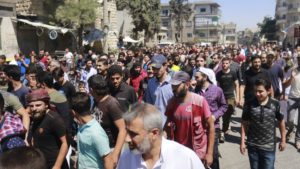Our small, extraordinarily efficient partners bringing hospital supplies into Syria are likely your best option for getting aid directly where you want it to go – to the doctors inside Idlib, and the people whose lives they are saving.
We say this in the wake of an article published yesterday by IRIN, a respected news publication, detailing a USAID investigation of a corruption ring that sought to line its pockets with Syrian aid money. Several individuals, including a former logistics officer with the Irish charity GOAL and the former Turkish country director of the International Rescue Committee, were given 5- or 10-year debarments from doing business with the U.S. government. Though not criminal convictions, debarments for fraud must be substantiated by a preponderance of the evidence.
Since March 2015, the USAID Office of the Inspector general (OIG) has been investigating “bid rigging, collusion, bribery, and kickbacks” in cross-border humanitarian aid supplied from Turkey to Syria. A significant portion of the approximately $500 million in international aid annually going to opposition-controlled areas comes through Turkey. Even a Save the Children staff member was found to have engaged in bid rigging and collusion as part of a concerted effort to manipulate the procurement process.
The International Rescue Committee and Save the Children are respected, eminent aid organizations, perceived widely as experts in needs assessment and delivery of humanitarian and development aid. They operate myriad programs ranging from the provision of medical services to the building of schools. Obviously, these organizations should not be judged on the basis of one staff member’s poor judgment. Save the Children spent $577,000 for auditors to conduct an internal investigation into the matter and quickly beefed up its systems and controls in response to the findings.
However, this disturbing news concerning fraud and corruption in aid procurement and delivery does suggest that sometimes going with a smaller organization with strong oversight and a transparent process is the better choice for donors who want to make sure their contributions actually reach the target beneficiaries and have a real impact.
Jewish World Watch’s projects offer precisely this type of security. Because our partners are relatively small and lean and are thoroughly vetted by experienced staff, constant contact and on-the-ground interactions, we know where your money is going and can hold the aid recipients accountable. Even more important, we select many of our grantee partners precisely because they offer innovative ways of targeting problems related to mass atrocities in ways that larger organizations can’t.
The remarkable organization we partner with to procure and ship hospital supplies inside Syria has been using its connections with Syrian doctors and their logistical expertise to deliver containers full of life-saving medical supplies directly to hospitals and doctors in opposition-controlled areas in Syria. Our partners constantly monitor the situation on the ground and email with their physician partners to understand what civilians need most, and strategize on how to deliver aid in the most timely and effective way possible. In a conflict region where aid is not only vulnerable to corruption but also has been used as a weapon of war by the Assad regime, our aid remains insulated from the type of fraud and corruption described above.
Jewish World Watch allows you to support innovative resources to fight conflicts, with oversight, and accountability. We cannot do this without you!
Please donate today to support our efforts to get hospital supplies directly to Syrian doctors saving lives and other projects.
[maxbutton id=”21″]
Our projects represent interventions aimed at preventing genocide and mass atrocities through a three-pronged approach: 1) supporting peacebuilding and educational efforts in vulnerable areas before atrocities unfold; 2) facilitating the delivery of vital, cutting-edge humanitarian aid to affected populations during ongoing conflict situations where larger organizations have difficulty operating; and 3) promoting education, attitudinal change, and sustainable livelihood development as a means of engendering stability in post conflict societies so as to protect them from future violence.


